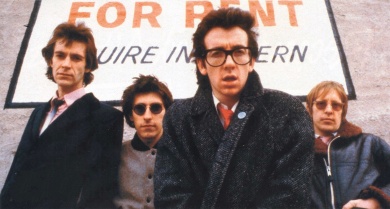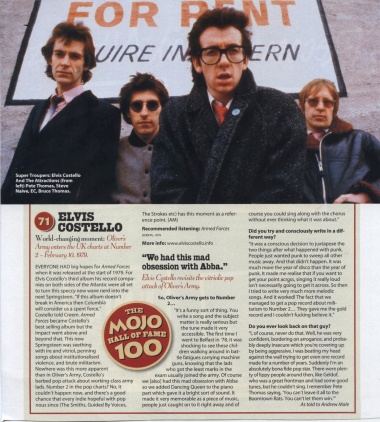Mojo, November 2003: Difference between revisions
(start page) |
(+photo year) |
||
| (6 intermediate revisions by the same user not shown) | |||
| Line 2: | Line 2: | ||
{{:Bibliography index}} | {{:Bibliography index}} | ||
{{:Mojo index}} | {{:Mojo index}} | ||
{{: | {{:UK & Ireland magazines index}} | ||
{{Bibliography article header}} | {{Bibliography article header}} | ||
<center><h3> | <center><h3> Elvis Costello revisits the vitriolic pop{{nb}}attack{{nb}}of{{nb}}Oliver's{{nb}}Army </h3></center> | ||
---- | ---- | ||
<center> Andrew Male </center> | <center> Andrew Male </center> | ||
---- | ---- | ||
{{Bibliography text}} | {{Bibliography text}} | ||
''So, "Oliver's Army" gets to Number 2... | |||
"It's a funny sort of thing. You write a song and the subject matter is really serious but the tune made it very accessible. The first time I went to [[Concert 1978-03-17 Belfast|Belfast]] in '78, it was shocking to see these children walking around in battle fatigues carrying machine guns, knowing that the lads who got the least marks in the exam usually joined the army. Of course we [also] had this mad obsession with ABBA so we added "Dancing Queen" to the piano part which gave it a bright sort of sound. It made it very memorable as a piece of music, people just caught on to it right away and of course you could sing along with the chorus without ever thinking what it was about." | |||
''Did you try and consciously write in a different way? | |||
"It was a conscious decision to juxtapose the two things after what happened with punk. People just wanted punk to sweep all other music away. And that didn't happen. It was much more the year of disco than the year of punk. It made me realise that if you want to get your point across, singing it really loud isn't necessarily going to get it across. So then I tried to write very much more melodic songs. And it worked! The fact that we managed to get a pop record about militarism to Number 2... They gave me the gold record and I couldn't fucking believe it." | |||
''Do you ever look back on that guy? | |||
"I, of course, never do that. Well, he was very confident, bordering on arrogance, and probably deeply insecure which you're covering up by being aggressive. I was beating my head against the wall trying to get even one record made for a number of years. Suddenly I'm an absolutely bona fide pop star. There were plenty of lippy people around then, like Geldof, who was a great frontman and had some good tunes, but he couldn't sing. I remember Pete Thomas saying, 'You can't leave it all to the Boomtown Rats. You can't let them win.'{{nb}}" | |||
{{cx}} | {{cx}} | ||
{{tags}}[[Oliver's Army]] {{-}} [[ABBA]] {{-}} [[Pete Thomas]] {{-}} [[Creem, May 1979|Creem]] {{-}} [[Armed Forces]] {{-}} [[Bruce Springsteen]] {{-}} [[The Smiths]] {{-}} [[The Strokes]] {{-}} [[Columbia Records]] | |||
{{cx}} | |||
<br> | |||
<center> | |||
<small>1979 photo by [[Keith Morris]].</small><br> | |||
[[image:2003-11-00 Mojo photo 01 km.jpg|390px]] | |||
</center> | |||
{{Bibliography notes header}} | {{Bibliography notes header}} | ||
| Line 20: | Line 37: | ||
{{Bibliography next | {{Bibliography next | ||
|prev = Mojo, October 2003 | |prev = Mojo, October 2003 | ||
|next = Mojo, | |next = Mojo, August 2004 | ||
}} | }} | ||
'''Mojo, No. 120, November 2003 | '''Mojo, No. 120, November 2003 | ||
---- | ---- | ||
[[Andrew Male]] | [[Andrew Male]] talks to Elvis Costello about "[[Oliver's Army]]," featured in ''Mojo'''s 10th anniversary Hall Of Fame 100. | ||
{{Bibliography images}} | {{Bibliography images}} | ||
[[image:2003-11-00 Mojo clipping 01.jpg| | [[image:2003-11-00 Mojo clipping 01.jpg|380px]] | ||
<br><small>Clipping.</small> | <br><small>Clipping.</small> | ||
{{Bibliography box}} | |||
<center><h3> The Mojo Hall Of Fame 100 </h3></center> | |||
---- | |||
<center> Andrew Male </center> | |||
---- | |||
'''71. {{t}}Elvis Costello | |||
'''World-changing moment: "Oliver's Army" enters the UK charts at Number 2 — February 10, 1979. | |||
{{Bibliography text}} | |||
Everyone had big hopes for ''Armed Forces'' when it was released at the start of 1979. For Elvis Costello's third album his record companies on both sides of the Atlantic were all set to turn this speccy new wave nerd into the next Springsteen. "If this album doesn't break in America then Columbia will consider us a spent force," Costello told ''[[Creem, May 1979|Creem]]''. ''Armed Forces'' became Costello's best selling album but the impact went above and beyond that. This new Springsteen was seething with ire and vitriol, penning songs about institutionalised violence, and brute militarism. Nowhere was this more apparent than in "Oliver's Army," Costello's barbed pop attack about working-class army lads. Number 2 in the pop charts? No, it couldn't happen now, and there's a good chance that every indie hopeful with pop nous since (The Smiths, Guided By Voices, The Strokes etc) has this moment as a reference point. | |||
{{cx}} | |||
'''Recommended listening: ''Armed Forces'' | |||
{{cx}} | |||
<small>Cover.</small><br> | |||
[[image:2003-11-00 Mojo cover.jpg|x120px|border]] | [[image:2003-11-00 Mojo cover.jpg|x120px|border]] | ||
{{Bibliography notes footer}} | {{Bibliography notes footer}} | ||
| Line 41: | Line 76: | ||
*[http://www.mojo4music.com/2040/mojo-issue-120-november-2003/ Mojo4music.com] | *[http://www.mojo4music.com/2040/mojo-issue-120-november-2003/ Mojo4music.com] | ||
*[http://en.wikipedia.org/wiki/Mojo_(magazine) Wikipedia: Mojo] | *[http://en.wikipedia.org/wiki/Mojo_(magazine) Wikipedia: Mojo] | ||
*[http://www.rocklistmusic.co.uk/mojo.html#The%20Mojo%20Hall%20of%20Fame%20100 rocklistmusic.co.uk] | |||
{{DEFAULTSORT:Mojo 2003-11-00}} | {{DEFAULTSORT:Mojo 2003-11-00}} | ||
| Line 47: | Line 83: | ||
[[Category:Mojo| Mojo 2003-11-00]] | [[Category:Mojo| Mojo 2003-11-00]] | ||
[[Category:Magazine articles]] | [[Category:Magazine articles]] | ||
[[Category:Interviews]] | |||
[[Category:2003 interviews]] | |||
Latest revision as of 05:06, 25 February 2023
|


